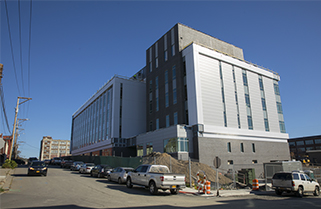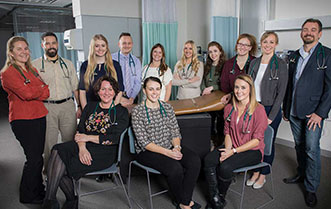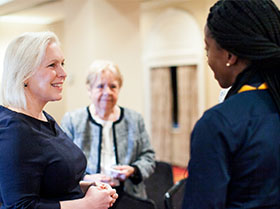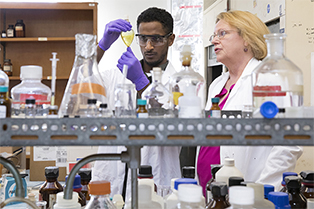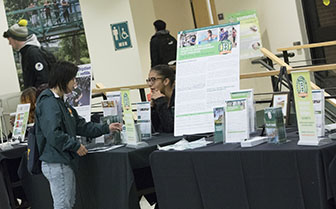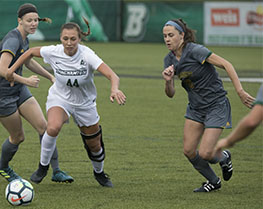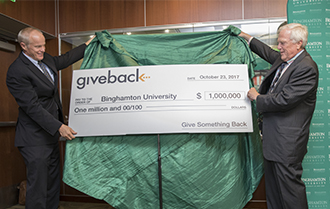Binghamton University President Harvey Stenger's Road Map Quarterly Report - December 31, 2017
The end of the fall semester, complete with shortened days and colder weather, finds members of the campus community eager for some well-deserved relaxation with friends and family. Some students have enrolled online for Winter Session classes during the break, trying to make up a course or move more quickly toward graduation, while faculty are using the break to catch up on research and writing they’ve put off during the hectic last days of the semester.
Overall, this has been a very good semester, filled with faculty achievements, successes in fundraising and alumni engagement, as well as progress on large campus initiatives.
At Binghamton we strive to help students cope with the stresses and anxiety that the end of the semester can produce. This semester we increased contact opportunities for students who feel in need of mental health counseling, providing after-hours phone counseling through our Counseling Center, which endeavors to teach students “resiliency” – the ability to approach challenges proactively and not become overwhelmed by them.
Part of being resilient involves taking a break from the things that produce anxiety, so we work to give students different ways to step away from their studies for a “time out.” The Office of the Dean of Students prepared a full slate of stress-reducing activities, ranging from yoga classes and open gym sessions to splatter-painting (good for taking out your aggressions) and everyone’s favorite, puppies. Students tell us – and science backs them up – that there is nothing more relaxing than spending time petting a puppy. Our dining services contributes with lots of cookies, cakes and ice cream, as well as comfort food to help students get proper nutrition so they can be at their best for their exams. Even the University Police have stepped in, with surprise gift cards given out to students found studying, working hard and maybe even speeding on campus. Our officers find that this is a good way to develop good will between students and our police department, which helps everyone be more successful all year round.
Like everyone else on campus, my last few weeks have been very busy, highlighted by a trip to Xian, China, where I attended a conference of Confucius Institute (CI) leaders. The Confucius Institute is a cultural exchange program established with support from the Chinese government, and Binghamton has had an active office since 2008. Ours is unique among CIs in that it focuses on Chinese language and traditional Chinese opera, with training in such areas as traditional Chinese instruments, opera costuming and stylized martial arts for the stage. Over the years, more than 4,000 students have taken courses in language and opera performance at Binghamton, and several of our students have received recognition in China for their language and performance abilities.
This trip reinforced China’s role as an important international partner with Binghamton. About 1,000 of our international students come from China, and we also have research partnerships with campuses in cities such as Beijing, Shenzhen, Soochow and Zhenjiang. During my visit, I met with presidents from other American and international universities that have Confucius Institutes on their campuses, and we exchanged information about how these programs impact our students. This visit also helped me better understand the current concerns among political leaders regarding the influence of the Chinese government in these programs, which, given our CI’s emphasis on cultural education, is very limited at Binghamton.
Binghamton is recognized as one of the most highly internationalized campuses in the United States. We are proud of the contributions our international students make to our campus, and are working to provide more opportunities for students to experience and celebrate their cultures.
This is a goal shared by Binghamton alumnus Charles Kim ’98, his wife, Jean Su Meang-Kim, and his brother, James W. Kim ’99, who provided a generous gift to establish the Young Sam Kim Korean Student Center. The center is named in honor of the Kims’ father, a Korean immigrant to the United States. Charles Kim is the founder of Alpine Securities and has been one of the University’s most generous donors. Over the years, he has supported student scholarships for students from Korean and Korean American families as well as students from the U.S. Virgin Islands. He also has generously given to the School of Management (SOM) Finance Curriculum support fund, which provides support for faculty retention and has provided for a dozen or more Bloomberg terminals for the SOM’s Zurack Trading Room. Charles Kim also serves on the Binghamton University Foundation Board of Directors and as its secretary, where we’ve come to value his insights and vision for the University.
The Korean Student Center gives our Korean students as well as others a space where they can plan and practice performances and explore their culture. The student center has a highly visible presence on campus in Old Champlain Hall, with two large Korean totems flanking the entrance and rooms outfitted with traditional Korean décor.
In a similar manner, hundreds of alumni stepped forward this quarter to support the cultural life of our Jewish students. At a ceremony held during Family Weekend, the campus celebrated the installation of the new Binghamton Legacy Torah for the Rohr Chabad Center. This celebration is an important cultural event for a campus where more than one-quarter of our students are Jewish. The Torah itself was commissioned by a broad group of students, parents and alumni, with thousands of sponsors from all around the globe.
Women’s Weekend
In November, our Alumni Association sponsored its first annual Women’s Weekend, which brought together around 120 alumnae, mostly from around the metro New York area, where the event was held. In my opening remarks, I provided an update of University activities, focusing on our Road Map initiatives and the new Health Sciences Campus we are developing in Johnson City, N.Y. I also spoke about women who are part of our leadership team at Binghamton as well as the path-breaking research conducted by our female faculty.
The conference included panels on several different topics, including professional success, philanthropy and the history of women’s activism. Panelists included faculty from our campus as well as successful alumnae authors, business leaders, attorneys and philanthropists. Attendees were thrilled by the closing speaker — U.S. Sen. Kirsten Gillibrand, who spoke about the importance of women’s suffrage (we are celebrating the 100th anniversary of women gaining the right to vote) as well as the continuing challenges working families face in today’s economy.
Philanthropic support
Academics were the focus of the fundraising at this year’s SOM Gala, held in New York City in early November. Alumnus Tony Kornheiser served as emcee for the event, which raised over $460,000 to support the development of an interdisciplinary Innovation Lab that will be equipped with the newest technologies, such as 3-D printers for rapid prototyping, as well as space for brainstorming and developing the designs, prototypes, concepts and pitches necessary for a successful product launch. The goal is to bring together students, faculty and alumni mentors from different departments, schools and firms to foster entrepreneurial projects. Only a handful of universities across the nation have anything comparable.
But the highlight of the evening was the recognition of Charles Kim ’98 and Harpur alumnus David Penski ’97, CEO of Publicis Media Exchange, as each were awarded the University Medal for their support for the University and the School of Management.
The SOM Gala was just one small part of a very successful quarter for philanthropic support. We also took time to recognize recipients of scholarships stewarded by the Binghamton University Foundation, and held separate receptions to recognize the support provided by Binghamton University Dining Services by Sodexo and Barnes & Noble, which operates our campus bookstore. All told, the Binghamton University Foundation will distribute $2.1 million in student scholarships, fellowships and awards this year. Meanwhile, our bookstore and food service providers provide more than $100,000 annually in scholarship support for over 60 student employees. These scholarships are crucial in helping us attract the best students to Binghamton, and help ensure that they graduate with less student debt.
This quarter also saw the dedication of the Charlene Kahlor Kramer Traditions Hallway in our Alumni Center reception area. This ceremony recognized the scholarship support provided by long-time friends of the University, Roger and Charlene Kramer. Together, Roger and Charlene supported several scholarships on campus that have helped nearly 50 students successfully graduate; in recognition of this, Charlene was awarded an honorary degree by the campus in 2004. Unfortunately, she died last year, and our Alumni Association felt this would be a fitting tribute to a consummate alumna.
Student scholarships also are at the heart of a new partnership Binghamton is developing with Robert Carr, founder and president of the Give Something Back Foundation, a national scholarship and mentoring organization. Give Something Back has agreed to provide more than $1 million to fund scholarships to Binghamton students; each year starting in 2021, 50 high-school students will be awarded full-ride scholarships to attend Binghamton University. Binghamton is just the third school in New York state to partner with Give Something Back, and we were selected because of our reputation as a premier higher education institution with excellent student support services. Under the agreement, the scholarship will provide approximately $20,000 per student every year for four years. The rest of the students’ expenses will be covered by Pell Grants and the University. The program targets students from low-income families and families that have faced other hardships.
Binghamton’s faculty also are giving back to the University to support the scholarly work of their colleagues. In December, the University recognized Distinguished Archeology and Anthropology Professor William Isbell and his wife Judy Siggins for their generous gift to establish the Andean Archeology and Anthropology Faculty Support Fund. This fund will help hire and retain faculty who share Isbell’s interest in Andean cultures. Isbell is an internationally recognized leader in his discipline who has played a role in shaping his discipline and added immensely to our understanding of pre-Columbian South America. The first faculty member to receive support from this fund is Assistant Professor of Anthropology BrieAnna S. Langlie. Her research interests focus on paleoethnobotany (the study of relationships between people and plants based on archaeological data) and how people have used plants, particularly for agriculture. She’s currently establishing her laboratory and by next year will be bringing in graduate and undergraduate students for training in the new lab. Isbell will retire at the end of the academic year, and through this gift he is leaving an impressive legacy and setting an example for fellow faculty to emulate.
Enrollment and admissions
The end of the fall semester usually marks the beginning of the peak admission season. Once again, Binghamton is on track to have a record number of applications – in fact, we are up by 20 percent compared to this time last year. One of our goals this year has been to review and offer admission to outstanding students earlier in the admission season. We believe that this will help us increase our yield among the top students.
Already, we’ve presented offers of admission to 3,000 applicants; this is the earliest decision release-time in recent memory, according to our admissions staff. We’ve also seen an increase in the number of transfer applications, and we are ahead of schedule in terms of commitments, with deposits up 9 percent compared to last year.
In addition, we have been working to increase the number of out-of-state applications we receive. This will help us increase our national recognition and will broaden our base of high-quality students. Toward this end, we’ve developed a system of territory managers for key markets, including New England and the mid-Atlantic, and have enhanced our communications and alumni outreach to prospective students, both in- and out-of-state.
Our new students will be excited to learn that a recent ranking by the Chronicle of Higher Education recognized Binghamton as one of the top 25 campuses for student mobility. They define this as having a student who enters college from the lowest quintile of household income, who, following graduation, reaches the top quintile for family earnings. Of course, career earnings are only one way to measure our students’ success, but it is a good marker for how Binghamton can change a student’s life.
Faculty recognition
The primary reason students attend Binghamton is the quality of the education they receive here. Their professors are outstanding teachers, mentors and guides, and for this reason we take time each year to recognize the best of our faculty. This year, we are pleased that the State University of New York has recognized the achievements of two Binghamton faculty members – Professor of History Jean Quataert, who was promoted to the rank of distinguished professor, and Anthropology Professor Gary James, who was recognized as a distinguished service professor. SUNY singled Quataert out for her pioneering contributions to German and women’s history, and more broadly for her studies that touch on global history and human rights, while James was honored for his exemplary service to Binghamton University, the medical community of the Binghamton region and to the national professional societies which he has served.
Here on campus, we held a reception in October to recognize the many faculty who have been identified by their colleagues as worthy of promotion. This year, we had nearly 75 promoted faculty, which, I believe, is a record number and reflects both the quality and ambition of our faculty as well as the success of the University’s efforts to support faculty in their professional development. It’s important to the campus that we keep the pipeline of excellent faculty moving, with assistant professors achieving associate status, associates becoming full professors and the very best of these becoming distinguished faculty. Promotions such as these communicate to our faculty our confidence in their work and our desire to keep them as members of the Binghamton University community.
Presidential communications
Communication is one of the most important aspects of effective administration, so my office and senior leadership team have been working hard to be both supportive of the campus and transparent in our discussions with the campus about challenges and our responses to them. This became especially clear in early October, when we were forced to address two extremely divisive incidents that both shocked and disappointed me.
Within the course of one week, two racist drawings were found in the residence halls; the first was in a fifth-floor study lounge in Endicott Hall of Newing College and included racist drawings and references to slavery. The second was discovered just three days later on a white board in Onondaga Hall in College-in-the-Woods.
Following the discovery of the second drawing, I sent a message to the entire campus expressing my anger and dismay. Not only were these drawings racist, ignorant and insensitive, they were potentially dangerous, as we can’t tell how others in the community might respond. In my message, I reaffirmed the University’s values of inclusion and intellectual engagement, and promised that the University would continue to promote these values while responding quickly to those who would try to divide the campus.
Clearly, this is a time of political upheaval, with rapidly changing policies and positions coming from Washington. In November, a proposal was floated during negotiations surrounding the federal Tax Cut and Jobs Act that would have a treated employer-provided tuition payments as taxable income, a policy that would have been devastating to graduate students, universities and the entire nation. The House also considered repealing the Student Loan Interest Deduction (SLID) and reducing tax credits for tuition that help students and their families offset college costs, all of which would have burdened families saving for college. When these proposals were first raised, the campus quickly and forcefully advocated on our students’ behalf with our House and Senate representatives, and joined with other campuses in opposing the measure. We also notified the campus community of our opposition via a Dateline statement that was delivered electronically to every member of the faculty, staff and student body. Apparently, our representatives have heard our voices, as the final bill passed in December did not include any of these provisions.
Budget
Financing for education is also a great concern as we look toward Albany and the 2018-19 budget. We are apprehensive about statements from both Gov. Andrew Cuomo and comptroller Thomas DiNapoli that there are fiscal stresses ahead, with a large structural deficit, currently estimated at more than $4 billion, as well as uncertainties regarding the impact of changes in federal tax law that might have a negative impact on New York state’s fiscal situation. Word from Albany is that state agencies will have to tighten their belts, and this will include higher education, particularly since SUNY is seen as having done well under the NYSUNY 2020 program over the past five years.
Also of concern is the fact that the state has recently negotiated salary increases for the CSEA state union, and is expected to do so for UUP in the very near future. Both of these unions include members who are employed at Binghamton. These raises are overdue – salaries have been frozen for several years – but we are worried that the state has so far not indicated that it will appropriate increases to cover these raises. This means that the colleges and universities will have to cover these out of their operating costs. For Binghamton, this is a recurring cost of about $3 million per year, but since the first-year raises will be retroactive, we will incur about $6 million in costs this first year. Fortunately, Binghamton is in good shape to meet these challenges because we’ve grown our enrollment and have managed our resources well, but it will still put stresses on our fiscal program.
In the meantime, we have been working to impress upon our legislators the important role that Binghamton plays in the region and the state and to show them how the state’s investments in Binghamton are having an impact.
One of the key messages that we are sharing is the way that Binghamton has followed through on state investments such as NYSUNY 2020, the Regional Economic Development Council and Upstate Revitalization Initiative, and that the commitments that we made in those programs are showing results with new facilities, increased enrollment, enhanced student success and larger economic impact.
Community impact
Members of the University community were present when Gov. Cuomo arrived in Endicott in early October to announce that one of the firms that developed out of the START-UP NY program, Charge CCV, will be at the center of a new consortium to develop and manufacture next-generation lithium-ion batteries for use in cars and other green applications. CCV founder Shailesh Upreti came to Binghamton to complete his PhD, working with Distinguished Professor M. Stanley Whittingham, and has worked on campus for the past 10 years.
The new firm, Imperium3, will be located at the Huron campus in Endicott and will, within a couple of years, employ up to 230 people. This is great news for Endicott and the entire Southern Tier.
And, of course, we continue to move forward on our new Health Sciences Campus that will be located in Johnson City. In October, School of Pharmacy and Pharmaceutical Sciences (SOPPS) Dean Gloria Meredith and Decker School of Nursing (DSON) Dean Mario Ortiz and I held a town hall in Johnson City to discuss the development of the campus and the work that will be done there. Residents are excited about the prospect of bringing more than 700 students and 150 faculty and staff into the village each day, when everything is up and running in 2020.
At the same time, I wanted to stress that although the University is proud to be able to help with local economic development, we can’t do it all, and we are eager to work with village and county leaders to develop the area in a way that meets both the needs of our students and the needs of the community. It is important that the village establish a development plan – we can’t, and we shouldn’t – be in charge of deciding how the area around the campus is developed.
Meanwhile, we continue to make progress with construction of the new campus. Most of the exterior work on the School of Pharmacy and Pharmaceutical Sciences is completed, and inside, drywall and telecommunications work is progressing, as is most of the installation of large mechanical equipment. We are on schedule for occupation next fall. Renovations to the Corliss Avenue building that will house the Decker School of Nursing continue apace, with all old mechanical equipment and asbestos removed.
The University has purchased several properties adjacent to the pharmacy and nursing buildings. These will be demolished and will provide parking and green space for the campus.
But what is most exciting about this project is that we are already seeing significant private investment in the community surrounding the campus. For example, the private sector developer that renovated the Press Building in downtown Binghamton has secured rights to 59 Lester Ave. — the large white building that has been a perennial eyesore in Johnson City – and is proposing a $32 million renovation of the building, featuring moderate-income housing. Other developers have purchased properties for mixed-use development, and we are hopeful that Johnson City, Binghamton and Endicott will all see some state funding to support street enhancement and other mixed-use development. These state investments should generate between $20 and $30 million in private investments in these communities.
This quarter also saw both SOPPS and DSON develop new programs that add to their educational reach. SOPPS has established an articulation agreement with SUNY Broome Community College. Under the agreement, eight qualified SUNY Broome students or students pursuing a Doctor of Pharmacy degree will be guaranteed acceptance into the SOPPS each year, beginning in fall 2019. Students must meet all SOPPS prerequisites and have at least a 3.0 GPA in math and science, as well as a composite score of at least 50 on the PCAT (Pharmacy College Admission Test). We feel this is a very good fit, as SUNY Broome has the largest health sciences division of all the SUNY community colleges and we already receive many transfer students from there.
Similarly, faculty in the Decker School, led by Nicole Rouhana, director of graduate programs in Decker, have received a $1.2 million Health Resources and Services Administration (HRSA) grant aimed at keeping rural advanced practice nurses in rural communities. This is a clinical training program that provides tuition assistance and technological support for students in the nurse practitioner program that allows them to remain engaged in their community while receiving their education. The program will support students from 12 rural locations in New York and Pennsylvania.
Athletics Hall of Fame/athletics successes
In December, the campus recognized the achievements of some of our very best student-athletes at our annual Athletics Hall of Fame celebration. This year saw the induction of three stellar individual athletes — softball player Mollie Lehman, baseball player Brendon Hitchcock and wrestler Josh Patterson, as well as the entire 1983 women’s cross-country team. All of these athletes richly deserve this recognition, as they helped propel their teams to conference championships and earned individual, national honors.
While the focus of the evening was on the individual achievements of the honorees, the Hall of Fame dinner also provides an opportunity to recognize the accomplishments of the broader athletics program, both on and off the field. This year we have seen our athletics program set records for academic success. Our program, with 400+ athletes, earned a combined GPA of 3.23 (that’s a B+ average) and 42 athletes were inducted into the College Athletics Honor Society this year. This marks the 21st semester that Binghamton athletes have held a GPA over 3.0. This is testimony, not only to the commitment of our students, but also of the hard work and dedication of our Athletics Department faculty and staff who hold our athletes to high standards. I want to thank Athletics Director Patrick Elliott for his efforts to see that our programs are successful while at the same time uphold our commitment to excellence, integrity and service.
Administrative changes
Several key administrative changes are taking place as the semester comes to an end. Jim Broschart, our vice president for advancement, is leaving for a new position as associate vice chancellor for university development and vice president of the North Carolina State Foundation. Jim’s work in advancement has made us a stronger University, with a significantly enhanced endowment and commitments for support that will help sustain us as we look to begin our next comprehensive gifts campaign. With Vice President for Student Affairs Brian Rose, I will oversee advancement operations until we complete a national search for Jim’s replacement.
Also, we are saying goodbye to Valerie Hampton, the University’s chief diversity officer (CDO) and founding director of our Division of Diversity, Equity and Inclusion. Hampton has done an admirable job as our first CDO, reinforcing our campus commitment to diversity, and working with us to find ways to better recruit and retain minority faculty, staff and students. Associate CDO Nicole Sirju-Johnson has been appointed interim CDO and director and we will conduct a national search for a permanent replacement.
Sincerely,

Harvey G. Stenger

